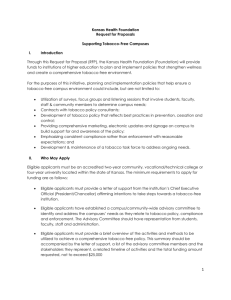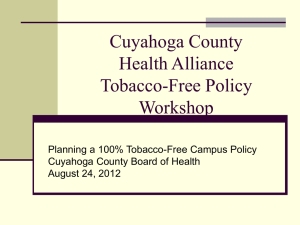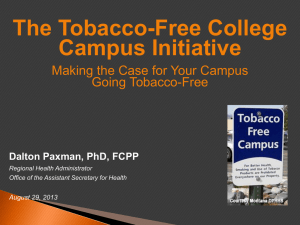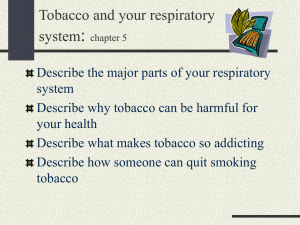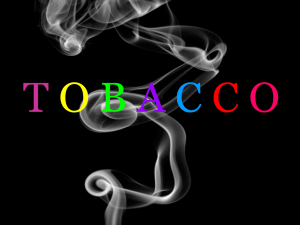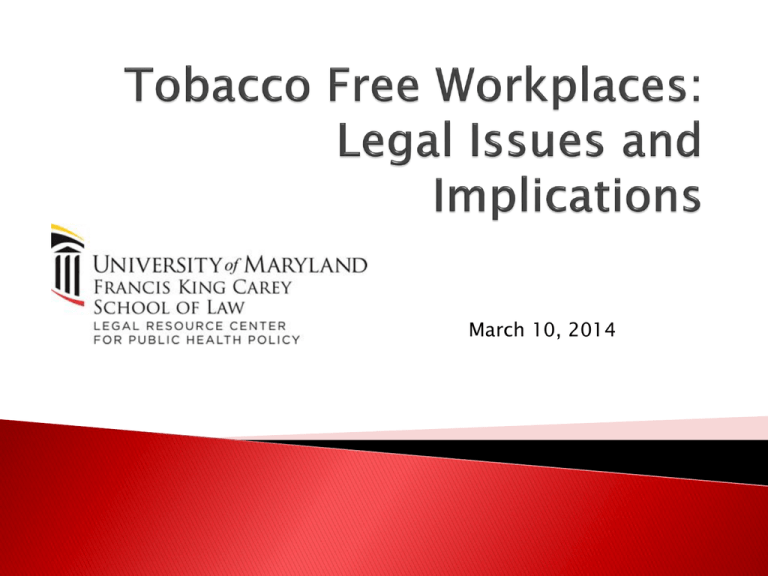
March 10, 2014
What are Tobacco-Free Policies?
Are Tobacco-Free Policies Legal?
Additional Considerations When
Contemplating a Tobacco-Free Policy
Definition – Policy that limits or prohibits the use
of any tobacco product, including cigarettes,
cigars, smokeless tobacco, hookah, ESDs, etc.
Types of Tobacco-Free Policies:
◦ Ban against use of tobacco products on campus
Ban includes buildings, grounds, parking areas, employer vehicles
Applies to employees, visitors, patients and volunteers
◦ Ban on employee tobacco use during work hours
Employees may not use tobacco products during work shift, even if
off campus
◦ Tobacco-Free employment and hiring policy
Employees prohibited from using tobacco products at all times
Tobacco use results in suspension/termination or revocation of job
offer
A tobacco-free policy is legal and valid if it
does not violate any constitutional right or
federal, state or local law.
Three Questions:
◦ Does the Constitution create a special right to
smoke or use tobacco?
◦ Does federal law prohibit tobacco-free policies?
◦ Does state or local law prohibit tobacco-free
policies?
Tobacco use is legal, but there is NO
constitutional right to use tobacco products
Proponents of tobacco user rights often
argue:
◦ Tobacco-Free policies violate an individual’s
constitutional right to privacy; OR
◦ Discriminate against a tobacco user in violation of
the Equal Protection Clause
Tobacco-free policies do NOT violate the
constitutional right to privacy
◦ “Fundamental right to privacy” is a type of liberty
specially protected under the constitution
◦ U.S. Supreme Court has repeatedly held that the
fundamental right to privacy only applies to marriage,
intimate relationships and rearing of children (i.e.
marriage, procreation, abortion, contraception and
raising/educating children)
◦ No court has extended this right to include smoking
◦ “There is no more a fundamental right to smoke
cigarettes than there is to snort heroin or cocaine or run
a red-light.” Fagan v. Axelrod , 550 N.Y.S. 552, 559
(1990).
Tobacco-Free policies do NOT discriminate against
tobacco users in violation of the Equal Protection
Clause
◦ The Equal Protection Clause guarantees “equal protection of the
laws,” meaning a law or policy cannot treat groups of people
differently without adequate justification
◦ Policies discriminating against an inherent or immutable
characteristic (i.e. gender, race or ethnicity) are rarely upheld,
but laws discriminating against other groups need only be
“rationally related to a legitimate government goal.”
◦ Tobacco use does not qualify because people are not born
using tobacco and although highly addictive, it is a behavior
people can stop.
Tobacco-free workplace policies are legal under
Federal law.
◦ Three major Federal laws prohibit employment
discrimination:
Title VII of the Civil Rights Act (1964)
Prohibits employment discrimination based on race, color,
religion, sex, or national origin
Genetic Information Nondiscrimination Act (2008)
Prohibits employment discrimination based on genetic
information about an applicant, employee, or former employee
Americans with Disabilities Act (1990)
prohibit employment discrimination against qualified individuals
with disabilities
Americans with Disabilities Act
◦ An employer shall not deny a qualified individual employment
because of a disability
◦ Law defines disability as a “physical or mental impairment that
substantially limits a major life activity.”
◦ Tobacco use or nicotine addiction does not qualify as a physical or
mental impairment under the Act.
◦ Nicotine addiction “…is not a ‘disability’ within the meaning of the
ADA. Congress could not possibly have intended the absurd result
of including smoking within the definition of ‘disability,’ which
would render somewhere between 25% and 30% of the American
public disabled...In any event, both smoking and ‘nicotine
addiction’ are readily remediable, either by quitting smoking
outright through an act of willpower or by the use of such items as
nicotine patches or nicotine chewing gum. If the smokers‘ nicotine
addiction is thus remediable, neither such addiction nor smoking
itself qualifies as a disability within the coverage of the ADA, under
well-settled Supreme Court precedent.” Brashear v. Simms, (Md.
2001)
Tobacco-Free Workplace Policies are Legal
under Maryland Law
◦ No Maryland law prohibits employers from making
employment decisions based on off-duty conduct,
including tobacco use
◦ “Smoker Protection Laws” – at least thirty states
(and D.C.) have laws that prevent employers from
discriminating based on off-duty conduct that is
legal, including tobacco use
◦ No statute in Maryland protects tobacco users from
discrimination
Tobacco-Free Employment Policies
◦ Tobacco users take more sick days than nontobacco users (Journal of Tobacco Policy &
Research)
◦ Even tobacco users in relatively good health have
higher medical costs
◦ Tobacco use is the leading preventable cause of
death and disease in the United States
◦ Health care organizations are charged with healing
the sick and cultivating healthier communities – it
makes sense to implement a tobacco-free
workplace policy
Tobacco-Free Policies and Labor Unions
◦ In union-represented work environments, employers may
be obligated to subject any tobacco-free policies to
collective bargaining, depending on contract provisions.
◦ The National Labor Relations Board (NLRB) has ruled
consistently that tobacco policies are a mandatory subject
of bargaining.
◦ In the absence of clear contract language to the contrary,
any proposed change to an existing workplace tobacco
policy can be implemented unilaterally only if both parties
have bargained to impasse and have reached a good-faith
deadlock on the policy issue
Lack of Evidence Demonstrating TobaccoFree Employment Policies Reduce Health Care
Costs
◦ “No longitudinal study provides demonstrable
evidence that employers who cease hiring tobacco
users reduce overall health care costs.” - University of
Pennsylvania Health System
◦ Requiring tobacco-using employees to pay a higher
premium on their healthcare benefit or enroll in
cessation courses may be more effective than
outright ban
Tobacco-Free Employment Policies adversely
impact lower socio-economic communities
◦ Tobacco use rates are significantly greater among
lower income and lower education groups
◦ Tobacco-free hiring policies disproportionately
affect poorer and less educated communities
Issues of Enforcement
◦ Nicotine testing (depending on type) may be
expensive
Studies indicate constant testing is required, because
individuals often begin using tobacco again after
passing a nicotine test
◦ Attestations are difficult to enforce
Legal Resource Center for Public Health Policy
University of Maryland Carey School of Law
P: (410) 706-0842
E: wtilburg@law.umaryland.edu

